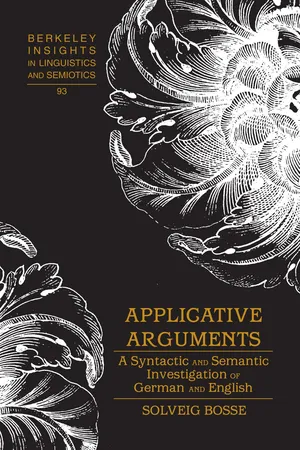
- 246 pages
- English
- PDF
- Available on iOS & Android
About this book
Applicative Arguments: A Syntactic and Semantic Investigation of German and English presents formal semantic and syntactic analyses of German and English applicative arguments. These arguments are nominal elements that are not obligatory parts of a sentence. Both German and English have several types of applicative arguments, including so-called benefactive and malefactive constructions. More specifically, the research relies on tests to differentiate the different types of applicative arguments based on this contribution to meaning: Some applicatives contribute only not-at-issue meaning, whereas others contribute only at-issue meaning, and still others contribute both types of meaning. These tests are applied to both German and English to uniquely identify the applicative arguments in each language. Formal analyses of the identified type of applicative arguments are presented that provide an account for each type of applicative identified for each language, explaining the applicatives' differences and similarities.
Frequently asked questions
- Essential is ideal for learners and professionals who enjoy exploring a wide range of subjects. Access the Essential Library with 800,000+ trusted titles and best-sellers across business, personal growth, and the humanities. Includes unlimited reading time and Standard Read Aloud voice.
- Complete: Perfect for advanced learners and researchers needing full, unrestricted access. Unlock 1.4M+ books across hundreds of subjects, including academic and specialized titles. The Complete Plan also includes advanced features like Premium Read Aloud and Research Assistant.
Please note we cannot support devices running on iOS 13 and Android 7 or earlier. Learn more about using the app.
Information
Table of contents
- Cover
- Contents
- 1 Introduction
- 2 Preliminaries
- 3 Affected Experiencers
- 4 Not-At-Issue Applicative Arguments
- 5 Benefactives
- 6 Part-Whole Applicatives
- 7 Dative of Inaction
- 8 Co-Occurrence of Applicatives
- 9 Conclusion
- Appendix 1: Affected Experiencers
- Appendix 2: Not-At-Issue Applicatives
- Appendix 3: Benefactives
- Appendix 4: Part-Whole Applicative
- Appendix 5: Dative of Inaction
- Glossary
- Bibliography
- Index